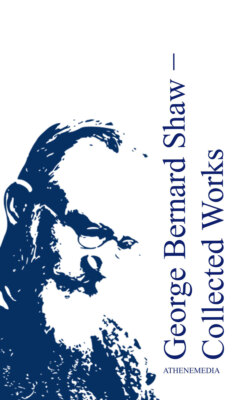Читать книгу Collected Works - George Bernard Shaw, Bernard Shaw - Страница 64
На сайте Литреса книга снята с продажи.
DEFYING THE LIGHTNING: A FRUSTRATED EXPERIMENT
ОглавлениеOne evening in 1878 or thereabouts, I, being then in my earliest twenties, was at a bachelor party of young men of the professional class in the house of a doctor in the Kensingtonian quarter of London. They fell to talking about religious revivals; and an anecdote was related of a man who, having incautiously scoffed at the mission of Messrs Moody and Sankey, a then famous firm of American evangelists, was subsequently carried home on a shutter, slain by divine vengeance as a blasphemer. A timid minority, without quite venturing to question the truth of the incident—for they naturally did not care to run the risk of going home on shutters themselves—nevertheless shewed a certain disposition to cavil at those who exulted in it; and something approaching to an argument began. At last it was alleged by the most evangelical of the disputants that Charles Bradlaugh, the most formidable atheist on the Secularist platform, had taken out his watch publicly and challenged the Almighty to strike him dead in five minutes if he really existed and disapproved of atheism. The leader of the cavillers, with great heat, repudiated this as a gross calumny, declaring that Bradlaugh had repeatedly and indignantly contradicted it, and implying that the atheist champion was far too pious a man to commit such a blasphemy. This exquisite confusion of ideas roused my sense of comedy. It was clear to me that the challenge attributed to Charles Bradlaugh was a scientific experiment of a quite simple, straightforward, and proper kind to ascertain whether the expression of atheistic opinions really did involve any personal risk. It was certainly the method taught in the Bible, Elijah having confuted the prophets of Baal in precisely that way, with every circumstance of bitter mockery of their god when he failed to send down fire from heaven. Accordingly I said that if the question at issue were whether the penalty of questioning the theology of Messrs Moody and Sankey was to be struck dead on the spot by an incensed deity, nothing could effect a more convincing settlement of it than the very obvious experiment attributed to Mr Bradlaugh, and that consequently if he had not tried it, he ought to have tried it. The omission, I added, was one which could easily be remedied there and then, as I happened to share Mr Bradlaugh's views as to the absurdity of the belief in these violent interferences with the order of nature by a short-tempered and thin-skinned supernatural deity. Therefore—and at that point I took out my watch.
The effect was electrical. Neither sceptics nor devotees were prepared to abide the result of the experiment. In vain did I urge the pious to trust in the accuracy of their deity's aim with a thunderbolt, and the justice of his discrimination between the innocent and the guilty. In vain did I appeal to the sceptics to accept the logical outcome of their scepticism: it soon appeared that when thunderbolts were in question there were no sceptics. Our host, seeing that his guests would vanish precipitately if the impious challenge were uttered, leaving him alone with a solitary infidel under sentence of extermination in five minutes, interposed and forbade the experiment, pleading at the same time for a change of subject. I of course complied, but could not refrain from remarking that though the dreadful words had not been uttered, yet, as the thought had been formulated in my mind, it was very doubtful whether the consequences could be averted by sealing my lips. However, the rest appeared to feel that the game would be played according to the rules, and that it mattered very little what I thought so long as I said nothing. Only the leader of the evangelical party, I thought, was a little preoccupied until five minutes had elapsed and the weather was still calm.
